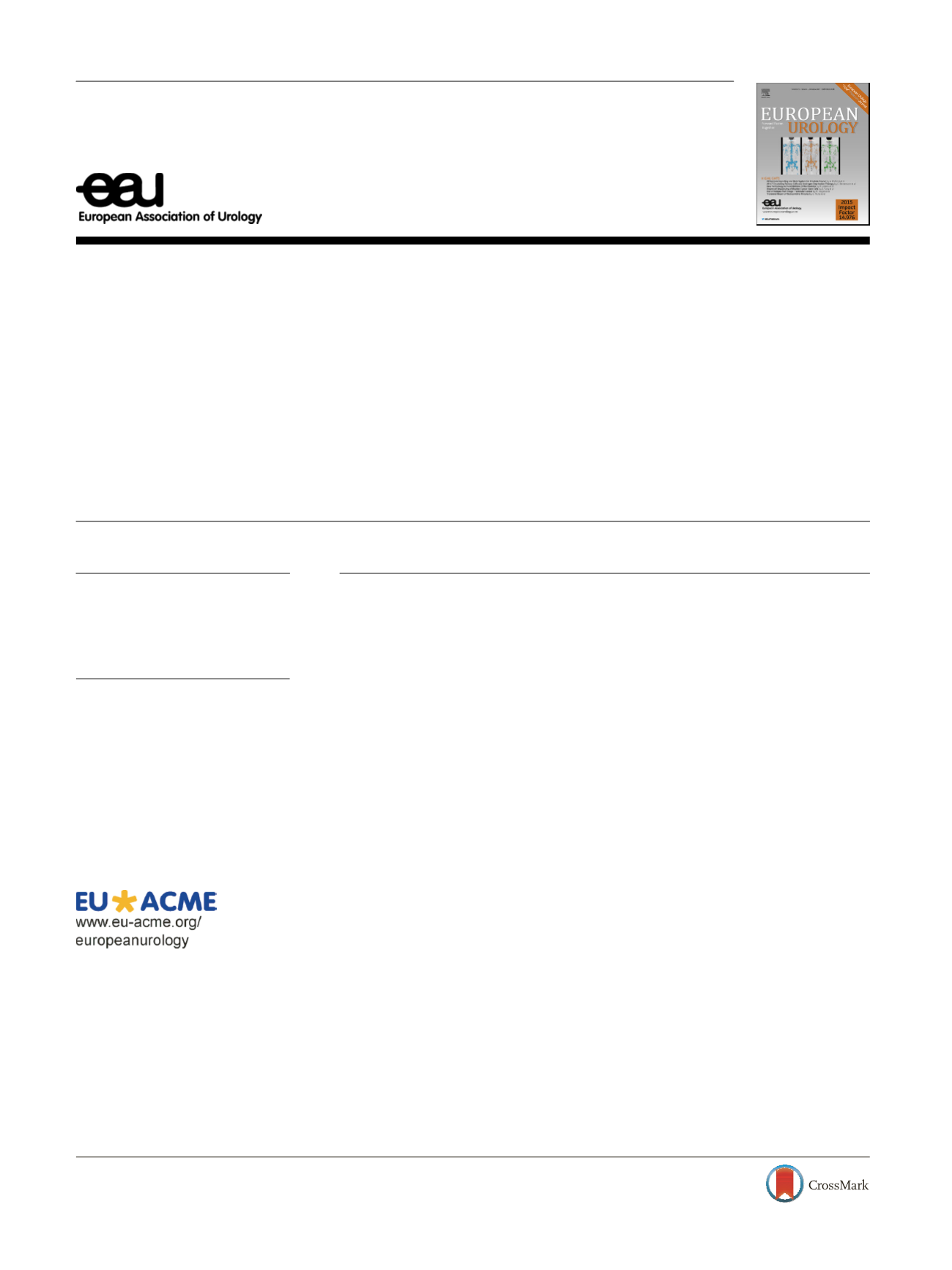

Platinum Priority – Andrology
Editorial by Taylor P. Kohn and Ranjith Ramasamy on pp. 1012–1013 of this issue
Meta-analysis of Results of Testosterone Therapy on Sexual
Function Based on International Index of Erectile Function Scores
Giovanni Corona
a ,Giulia Rastrelli
b ,Abraham Morgentaler
c ,Alessandra Sforza
a ,Edoardo Mannucci
b , d ,Mario Maggi
b , *a
Endocrinology Unit, Medical Department, Azienda Usl Bologna Maggiore-Bellaria Hospital, Bologna, Italy;
b
Andrology and Sexual Medicine Unit,
Department of Experimental and Clinical Biomedical Sciences, University of Florence, Florence, Italy;
c
Men’s Health Boston, Harvard Medical School, Boston,
MA, USA;
d
Diabetes Agency, Careggi Hospital, Florence, Italy
E U R O P E A N U R O L O G Y 7 2 ( 2 0 1 7 ) 1 0 0 0 – 1 0 1 1available at
www.scienced irect.comjournal homepage:
www.europeanurology.comArticle info
Article history:
Accepted March 21, 2017
Associate Editor:
Christian Gratzke
Keywords:
Erection
Ejaculation
Erectile dysfunction
Libido
International Index of Erectile
Function
Testosterone
Sexual function
Orgasm
Please visit
www.eu-acme.org/ europeanurologyto read and
answer questions on-line.
The EU-ACME credits will
then be attributed
automatically.
Abstract
Context:
The interpretation of available clinical evidence related to the effect of testosterone
(T) treatment (TTh) on sexual function has been inconsistent, in part due to the use of different
and self-reported measures to assess outcomes. The International Index of Erectile Function
(IIEF) is the most frequently used validated tool to assess male sexual function.
Objective:
To perform a meta-analysis of available data evaluating the effect of TTh on male
sexual function using IIEF as the primary outcome.
Evidence acquisition:
An extensive Medline, Embase, and Cochrane search was performed
including all placebo-controlled randomized clinical trials enrolling men comparing the effect
of TTh on sexual function.
Evidence synthesis:
Out of 137 retrieved articles, 14 were included in the study enrolling
2298 participants, with a mean follow-up of 40.1 wk and mean age of 60.2 6.5 yr. Using IIEF-
erectile function domain (IIEF-EFD) as the outcome, we found that TTh significantly improved
erectile function compared with placebo (mean difference = 2.31 [1.41;3.22] IIEF-EFD score,
p
<
0.0001). Patients with more severe hypogonadism (total T
<
8 nmol/l) reported greater
changes in final IIEF-EFD score when compared with those with a milder T deficiency (total
T
<
12 nmol/l; 1.47 [0.90;2.03] and 2.95 [1.86;4.03] for total T
<
12 nmol/l and
<
8 nmol/l,
respectively, Q = 5.61,
p
= 0.02). The magnitude of the effect was lower in the presence of
metabolic derangements, such as diabetes and obesity. Other aspects of sexual function, as
evaluated by IIEF subdomains, were also improved with TTh including libido, intercourse
satisfaction, orgasm, and overall sexual satisfaction.
Conclusions:
TTh significantly improves erectile function and other sexual parameters as
measured by IIEF in hypogonadal men. These results argue that sexual dysfunction should be
considered a hallmark manifestation of T deficiency, since those symptoms can be signifi-
cantly improved with normalization of serum T. In addition, these results suggest that TTh
alone may be considered a reasonable treatment for hypogonadal men with milder degrees of
erectile dysfunction, whereas the addition of other treatments, such as phosphodiesterase
type 5 inhibitors, may be more appropriate for men with more severe erectile dysfunction.
Patient summary:
We investigated the effect of testosterone treatment on sexual function by
performing a meta-analysis of all available studies that used the most frequently used
assessment tool, the International Index of Erectile Function. We found that testosterone
treatment significantly improves erectile dysfunction, as well as other aspects of sexual
function, in men with testosterone deficiency. This treatment may be all that is required for
hypogonadal men with milder erectile dysfunction; however, additional treatments may be
necessary in more severe cases.
#
2017 Published by Elsevier B.V. on behalf of European Association of Urology.
* Corresponding author. Andrology and Sexual Medicine Unit, Department of Experimental and
Clinical Biomedical Sciences, University of Florence, Viale Pieraccini 6, Florence 50139, Italy.
Tel. +39-55-4271415; Fax: +39-55-4271413.
E-mail address:
m.maggi@dfc.unifi.it(M. Maggi).
http://dx.doi.org/10.1016/j.eururo.2017.03.0320302-2838/
#
2017 Published by Elsevier B.V. on behalf of European Association of Urology.
















